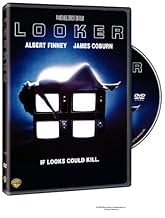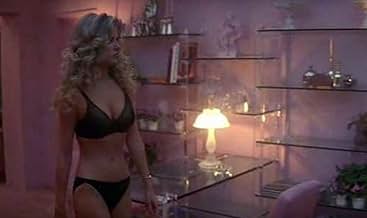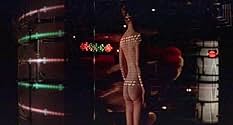CALIFICACIÓN DE IMDb
6.1/10
6.6 k
TU CALIFICACIÓN
Un cirujano plástico de Beverly Hills (Albert Finney) es el sospechoso de una trama criminal porque todas las modelos que opera aparecen muertas en misteriosas circunstancias.Un cirujano plástico de Beverly Hills (Albert Finney) es el sospechoso de una trama criminal porque todas las modelos que opera aparecen muertas en misteriosas circunstancias.Un cirujano plástico de Beverly Hills (Albert Finney) es el sospechoso de una trama criminal porque todas las modelos que opera aparecen muertas en misteriosas circunstancias.
- Dirección
- Guionista
- Elenco
- Premios
- 1 premio ganado y 1 nominación en total
Michael Hawkins
- Senator Robert Harrison
- (as Michael Gainsborough)
Donna Kei Benz
- Ellen
- (as Donna Benz)
Terrence E. McNally
- Technician in Scanning Room
- (as Terrence McNally)
- Dirección
- Guionista
- Todo el elenco y el equipo
- Producción, taquilla y más en IMDbPro
Opiniones destacadas
You can take Michael Crichton's Looker, a way-back-then-high tech thriller with a media-industrial complex, one of two ways. Either it's an interesting preview of computer graphics being used for nefarious advertising gain, with a crime mystery to solve or it's a clumsily acted and directed story of how James Coburn is out to slaughter Albert Finney and Susan Dey using all sorts of out-of-this-world gizmos and tactics.
Personally, I think it's both.
Much like Crichton's Westworld, the movie depends heavily on the computer arts to fill in for substance, and like Westworld, it succeeds. Looker is a pleasant and exciting little period piece, a time capsule for what science and advertising might be heading toward in the not too distant future.
To be fair to yourself, you must forgive the creaky performances by Finney, Dey, and Coburn (plus everyone else). It's the combination of guns, girls, and gadgets that keep the story moving (Crichton gets your attention at the very start by introducing a television lovely asking plastic surgeon Finney to alter her in strangely precise details; then you get the pre-surgery mugshots of the girl with her supposed imperfections--and what imperfections!--in full view). It's cheap and creepy, but everyone in the theater was hooked instantly by the looker on screen.
Don't look too closely, though. The plot holes are big and numerous, so thinking is not recommended. It's the flash-attachments-on-steroids that cause catatonia and the computer mapping of Susan Dey, standing there with her imperfections exposed, that keep you interested. It's strange--I've always liked Dey's looks and I'm not about to complain about seeing her in the all-together, but the bloodlessness of computers, their soul-less nature robs the scene of its prurient nature.
Crichton has hit upon something here. Computers make us so nervous, even a quarter century later, that the use of a story of cynical cyber-manipulation of consumers robs the viewer of getting his or her jollies out of seeing good-looking people nekked or in danger or both. In some ways it robs us of our interest in the human drama that movies depend on to be of lasting quality. It's a double edged sword, but it's both subtle and very effective.
In general, Looker isn't subtle, nor is it a wholly satisfying entertainment, but it does deserve a look.
Personally, I think it's both.
Much like Crichton's Westworld, the movie depends heavily on the computer arts to fill in for substance, and like Westworld, it succeeds. Looker is a pleasant and exciting little period piece, a time capsule for what science and advertising might be heading toward in the not too distant future.
To be fair to yourself, you must forgive the creaky performances by Finney, Dey, and Coburn (plus everyone else). It's the combination of guns, girls, and gadgets that keep the story moving (Crichton gets your attention at the very start by introducing a television lovely asking plastic surgeon Finney to alter her in strangely precise details; then you get the pre-surgery mugshots of the girl with her supposed imperfections--and what imperfections!--in full view). It's cheap and creepy, but everyone in the theater was hooked instantly by the looker on screen.
Don't look too closely, though. The plot holes are big and numerous, so thinking is not recommended. It's the flash-attachments-on-steroids that cause catatonia and the computer mapping of Susan Dey, standing there with her imperfections exposed, that keep you interested. It's strange--I've always liked Dey's looks and I'm not about to complain about seeing her in the all-together, but the bloodlessness of computers, their soul-less nature robs the scene of its prurient nature.
Crichton has hit upon something here. Computers make us so nervous, even a quarter century later, that the use of a story of cynical cyber-manipulation of consumers robs the viewer of getting his or her jollies out of seeing good-looking people nekked or in danger or both. In some ways it robs us of our interest in the human drama that movies depend on to be of lasting quality. It's a double edged sword, but it's both subtle and very effective.
In general, Looker isn't subtle, nor is it a wholly satisfying entertainment, but it does deserve a look.
This movie still holds up. I'm incredibly impatient for films to get going. So, this one is a keeper. Truly entertaining from start to finish. Even the theme song is catchy. Visually fun. Well directed.
I first saw this movie on HBO as a child. I couldn't remember the name of th movie or who played in it, but I couldn't get the scene of Albert Finney on the commercial set near the end of the movie out of my mind. After asking around using that scene as my only guide, I was finally able to get someone to tell me.
After watching it again, I was very interested in the movie's plot despite how ridiculous it seemed. For example, why would RI security officers be at the scene of a car accident? Why didn't DMI use computers to generate locations as well as models? Or why did the mustachioed man suddenly remember he had those special glasses in the car chase scene only AFTER being shot by the LOOKER gun? There are others.
But it has it's redeeming qualities as well. The music is captivating and helps to build on the excitement of some of the action scenes. And I don't believe I've seen a more passionate kick to the groin than the one given by Albert Finney. All in all, Looker would probably not stand up next to today's movies, but it has a charm about it. It must have made some kind of impression on me as a child to remain in my head for the past 25 years. Recommended rental. Buy it if you like off-beat, quasi-mainstream movies. I bought it and plan on getting good use out of it. Perfect for unsuspecting house guests.
After watching it again, I was very interested in the movie's plot despite how ridiculous it seemed. For example, why would RI security officers be at the scene of a car accident? Why didn't DMI use computers to generate locations as well as models? Or why did the mustachioed man suddenly remember he had those special glasses in the car chase scene only AFTER being shot by the LOOKER gun? There are others.
But it has it's redeeming qualities as well. The music is captivating and helps to build on the excitement of some of the action scenes. And I don't believe I've seen a more passionate kick to the groin than the one given by Albert Finney. All in all, Looker would probably not stand up next to today's movies, but it has a charm about it. It must have made some kind of impression on me as a child to remain in my head for the past 25 years. Recommended rental. Buy it if you like off-beat, quasi-mainstream movies. I bought it and plan on getting good use out of it. Perfect for unsuspecting house guests.
A plastic surgeon gets suspicious when the police question him about the death of a model he's worked on, and learns that all the models he's worked on who came in with "shopping lists" of miniscule changes that "had to be fixed, so I could be perfect," are dead. Susan Day has just come in with a list of her own, and he decides to keep an eye on her - and learns of a plot to use computer generated images made from detailed electronic measurements of the models to replace live models for commercials and acting. One bonus is about 3 minutes of Susan Day being measured, sans clothing. Let's face it, every boy who grew up watching "The Partridge Family" dreamed of the chance to see her like this! (The nudity is handled tastefully - there's nothing graphic.)
Plastic surgeon in Los Angeles investigates after some of his most beautiful clients--all fashion models--turn up dead. Thriller has a now-dated design but a terrific set-up. Writer-director Michael Crichton keeps his premise absorbing and exciting for about a third of its length, though he later resorts to assembly-line action, ending the picture on a whimper. Albert Finney just fine in the lead, Susan Dey terrific as his sidekick, yet the characters themselves are rather one-dimensional. Strictly as a time-filler, not bad. **1/2 from ****
¿Sabías que…?
- TriviaThe first ever film to create 3D shading with a computer that produced the first ever CGI human character was the model Cindy (Susan Dey). This movie achieved this feat before Disney's more famous Tron (1982) hit the screens. The Web site Filmsite said of Cindy: "Her digitization was visualized by a computer-generated simulation of her body being scanned--notably the first use of shaded 3D CGI in a feature film. Polygonal models obtained by digitizing a human body were used to render the effects."
- ErroresAt the conference near the end, when Dr. Larry Roberts is disguised as a security guard, during several sequences getting in and out of elevators the wound on the side of his mouth disappears and reappears.
- Citas
Cindy Fairmont: Hi. I'm Cindy. I'm the perfect female type: 18 to 25. I'm here to sell for you.
- Versiones alternativasThe broadcast television version contains additional footage, including a scene where Reston (James Coburn) explains to Dr. Roberts (Albert Finney and Cindy ('Susan Dey') why Digital Matrix had the "perfect" models killed.
- ConexionesFeatured in Room 237 (2012)
Selecciones populares
Inicia sesión para calificar y agrega a la lista de videos para obtener recomendaciones personalizadas
- How long is Looker?Con tecnología de Alexa
Detalles
- Fecha de lanzamiento
- País de origen
- Idioma
- También se conoce como
- Looker
- Locaciones de filmación
- Art Center College of Design, Pasadena, California, Estados Unidos(Interiors and exteriors. As 'Digital Matrix Inc.' headquarters building.)
- Productoras
- Ver más créditos de la compañía en IMDbPro
Taquilla
- Presupuesto
- USD 8,000,000 (estimado)
- Tiempo de ejecución
- 1h 33min(93 min)
- Color
- Mezcla de sonido
- Relación de aspecto
- 2.39 : 1
Contribuir a esta página
Sugiere una edición o agrega el contenido que falta

































